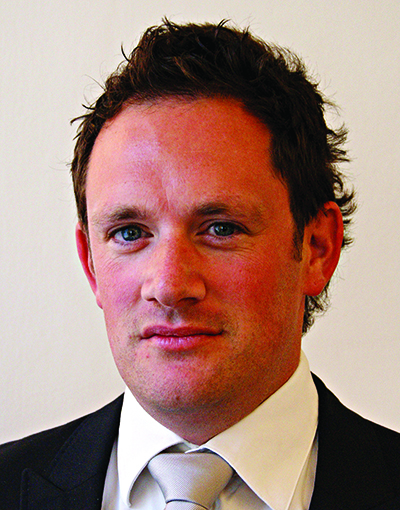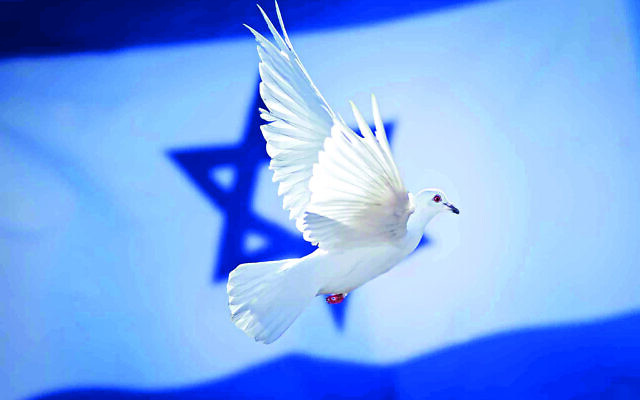OPINION: Despite stalemate with the Palestinians, Israel at 75 is more successful than ever
Pragmatism has brought Israel many rewards, but a deal with the Palestinians eludes her, writes Richard Pater
Even on the cusp of war, Israeli leaders were hoping for peace. As stated in the Declaration of Independence, the new Jewish state would “extend its hand to all neighbouring states and their peoples in an offer of peace and good neighbourliness”.
Similarly, Israel’s first prime minister, David Ben-Gurion, spoke frequently of peace. On one occasion he told the Knesset in June 1948, ‘We are prepared to make peace with our Arab neighbours on the basis of justice and equality. We are ready to negotiate a settlement that will ensure lasting peace for all.” Peace even finds expression in the logo of the IDF: a sword and an olive branch.
While some religious Jews saw Balaam’s Biblical statement that the Jews were a nation who dwells alone as a blessing, many early Zionists considered it a curse and sought to reverse it. They thus sought a reality in which a proud independent Jewish-democratic state would find its ‘place among the nations’.

As a result, Israel’s founding fathers placed great emphasis on the importance of international recognition; both bilateral and at the United Nations (note with irony the politicised role and inbuilt anti-Israel bias of the UN and the general disdain of Israel’s current crop of leaders).
The United States of America was the first country to recognise Israeli independence followed by Guatemala (the same day) and the Soviet Union three days later on 18 May 1948. By August, 15 countries had recognised Israel.
By early 1949 this list had grown to 33, including the United Kingdom and most of western Europe. By April, 53 countries had recognised Israel and in May that year Israel was accepted as a member of the General Assembly of the UN. By then Israel had signed armistice agreements to end the fighting, elections had been held, and the Provisional Government handed over power based on the election result.
Even before Israel’s independence, the mainstream Zionist default position was pragmatic. Its response was always to say ‘yes’, and agree to compromise (see for example the 1937 Peel plan and the UN Partition Plan 1947).
Only later did Israel begin to say ‘yes, but’ and occasionally even ‘no’. After 1967, when Israel’s cabinet was split over suing for peace or retaining some of the mountain ridge for security, the leadership were on balance disposed towards a ‘yes’ – a principle that later became formulated as ‘land for peace’. The Arab leadership meanwhile – stung by their humiliation by those pesky Jews – delivered their three ‘no’s.
Even before Israel’s independence, the mainstream Zionist default position was pragmatic.
Until recently, the conventional thinking was that all roads to peace lead through the Muqata in Ramallah. The paradigm shift of the Abraham Accords turned that logic on its head. The Emiratis, for example, wondered why their interests of engaging with Israel, and benefiting from Israeli tech, should have been held up because of Palestinian intransigence.
The high tide for peace with Palestinians came in the 1990s with the Oslo process and its signing on the White House lawn by a slightly reticent Prime Minister Rabin and Palestine Liberation Organisation chairman Arafat – who even then (and subsequently) never removed his military fatigues.
What followed was the 1995 division of the West Bank into Areas A,B & C, which, whilst clearly below the Palestinians threshold for a fully independent state, does mean that more than 95 percent of West Bank Palestinians live under Palestinian Authority self-rule. Oslo’s abiding legacy proves the axiom that ‘nothing is more permanent than a temporary solution’.
The landmark peace agreements with Egypt and subsequently Jordan remain the strategic underpinnings of Israel’s regional security doctrine, with the peace treaties delivering valuable strategic depth. Despite often being formulated as a ‘cold peace’, senior Israeli security officials recognise the ongoing importance of those relations to Israel’s security posture.
Earlier this year, a new international quintet – Israel, the United States, Jordan, Egypt and the Palestinians – convened twice: in Aqaba and then in Sharm al-Sheikh, in order to try to revive Israeli-Palestinian security coordination and create confidence-building measures to improve the PA’s economic situation.
Whilst civil affairs minister Hussein Al- Sheikh represented the Palestinians, other senior PA officials simultaneously called for lawfare against Israel through international institutions. If we are honest, the current Israeli government could also be accused of dual messaging. Whilst the majority support the traditional Benjamin Netanyahu approach of conflict management, Itamar Ben-Gvir and his allies believe in confrontation, not accommodation.
Israel after 75 years is thus balancing two opposing currents: stalemate on a substantive diplomatic resolution to the Palestinian issue, whilst in parallel continued expansion of regional alliances.
To the West, Israel’s partnerships stretch to Morocco and within the Mediterranean includes close friendship with Greece and Cyprus, which have never been stronger. Relations with Turkey are also back on track. Beyond Egypt and Jordan, Israel’s alliances reach to the Gulf and extend to India. Many in Israel dearly hope to be able to expand and deepen the circle of peace even further.
Despite Israel’s unresolved issues, Israel at 75 is more successful, prosperous and powerful, beyond Ben-Gurion’s dreams.
- Richard Pater is chief executive of BICOM and a political analyst based in Jerusalem

Thank you for helping to make Jewish News the leading source of news and opinion for the UK Jewish community. Today we're asking for your invaluable help to continue putting our community first in everything we do.
For as little as £5 a month you can help sustain the vital work we do in celebrating and standing up for Jewish life in Britain.
Jewish News holds our community together and keeps us connected. Like a synagogue, it’s where people turn to feel part of something bigger. It also proudly shows the rest of Britain the vibrancy and rich culture of modern Jewish life.
You can make a quick and easy one-off or monthly contribution of £5, £10, £20 or any other sum you’re comfortable with.
100% of your donation will help us continue celebrating our community, in all its dynamic diversity...
Engaging
Being a community platform means so much more than producing a newspaper and website. One of our proudest roles is media partnering with our invaluable charities to amplify the outstanding work they do to help us all.
Celebrating
There’s no shortage of oys in the world but Jewish News takes every opportunity to celebrate the joys too, through projects like Night of Heroes, 40 Under 40 and other compelling countdowns that make the community kvell with pride.
Pioneering
In the first collaboration between media outlets from different faiths, Jewish News worked with British Muslim TV and Church Times to produce a list of young activists leading the way on interfaith understanding.
Campaigning
Royal Mail issued a stamp honouring Holocaust hero Sir Nicholas Winton after a Jewish News campaign attracted more than 100,000 backers. Jewish Newsalso produces special editions of the paper highlighting pressing issues including mental health and Holocaust remembrance.
Easy access
In an age when news is readily accessible, Jewish News provides high-quality content free online and offline, removing any financial barriers to connecting people.
Voice of our community to wider society
The Jewish News team regularly appears on TV, radio and on the pages of the national press to comment on stories about the Jewish community. Easy access to the paper on the streets of London also means Jewish News provides an invaluable window into the community for the country at large.
We hope you agree all this is worth preserving.






















